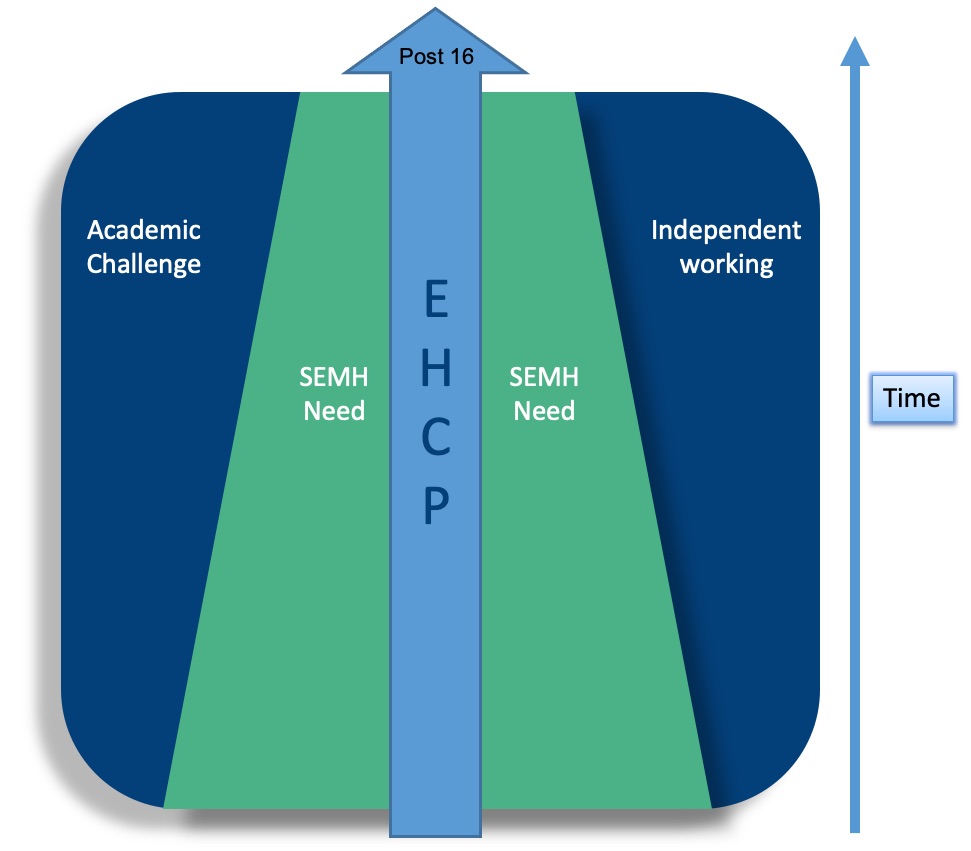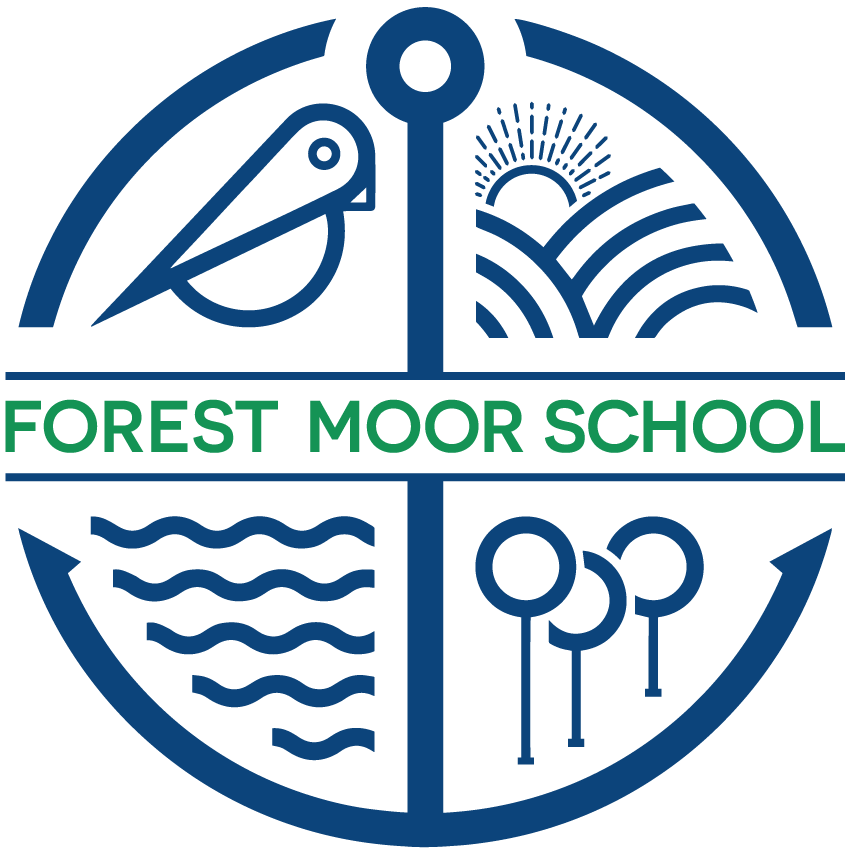Here at Forest Moor School, we create personalised pathways for our students that are regularly reviewed and adjusted to meet their varied needs as we recognise over time these needs will be fluid at present differently depending on the challenges they face. In order to achieve this we have developed a curriculum that interlinks the EHCP, SEMH and academic requirements to always ensure students are making progress in one or more of these areas. By operating a personalised and flexibly consistent approach to progress, our pupils are always able to experience success, whether that be working through crisis or engaging with challenging class based learning.

Curriculum Intent
The curriculum at Forest Moor is designed to provide an opportunity for our pupils to learn in a safe, supportive and nurturing environment. Therefore, at Forest Moor, we offer an innovative curriculum that looks to meet the needs of the young people in our care and meet their additional needs through a personalised approach. This approach places the SEMH development of our children at the forefront of everything they do. Thus, the curriculum is there to support and enable their SEMH and academic development as one; If a child is unable to regulate, they are unable to learn.
Our aims, across our three stages of learning, are to:
- Support the individual development and growth of the holistic child at their own varied starting points;
- Help enable pupils to feel comfortable and to have opportunities to access positive experiences in education;
- Help children feel safe and secure in education;
- Foster strong relationships with peers and adults within their microsystem;
- Use these understandings of microsystemic relationships to develop relationships outside of their immediate sphere;
- Develop a love of learning;
- Develop an understanding with the hope of fostering a love of reading;
- Prepare children as they progress through their educational journey and onto their next steps in life (i.e. education, work or training).
In turn, our curriculum model will aim to develop their: ability to succeed (in learning and life); develop a positive self–esteem; their resilience towards tasks and issues they may face; the pupil’s ability to regulate behaviours when faced with adversity and, to be proud of their achievements and learn to share these positively with others. Through these clear and progressive aims, we look to contribute to their holistic development (including their spiritual, moral, cultural, mental and physical development) and their widening understanding of the world within a broad and balanced curriculum developed around nurturing the children in our care.
In order to develop a young person’s SEMH needs and EHCP targets, as commissioned by the DfE as an SEMH specialist provision, the curriculum offered at Forest Moor specifically aims to develop, assess and track the SEMH target development alongside the academic development of each individual.
The progression of SEMH development requires a contextual understanding and thematic analysis of actions and experiences. Therefore, the development of SEMH targets is not related to the quantification of thematically analysed actions and experiences. Through this premise, a young person’s SEMH development is the completion of that target in an individual setting or experience.
Similar to academic development, repetition of this action is not showing progression but repetition. Therefore, progression occurs through the application of the aforementioned target in another setting or experience which may have been previously hindered by their SEMH needs. Thus, mastery in all areas of SEMH development is often unattainable for the majority of people – never mind those with SEMH difficulties. As a consequence, the focus on individualised and personalised successes, and staff understanding of these, is crucial to the development of an effective SEMH curriculum.
In conclusion, an SEMH curriculum requires the understanding and thematic analysis of individual experiences and successes and how these relate to learning. This is instead of a quantification of thematically analysed experiences and successes. And, it is our understanding of these, and the intertwinement of SEMH, EHCP and Academic development, that enhances a child’s potential for development, understanding and success in a SEMH curriculum.
Curriculum Implementation
Forest Moor curriculum strategy food tech curriculum strategy Explore curriculum strategy ASDAN curriculum strategy Pe curriculum strategyIn order to develop the SEMH needs and EHCP targets, as commissioned by the DfE as an SEMH specialist provision, the curriculum offered at Forest Moor specifically aims to develop, assess and track the SEMH target development alongside the academic development of each individual. In order to do this, we place the EHCP, SEMH development and The Four Threads of Behaviour’ at the core of our curriculum. This means that the development of SEMH targets and EHCP outcomes are the continual thread (figure 2) within our curriculum. In turn, the academic opportunities are there to develop these outcomes and targets while providing greater access to a wider, more bespoke curriculum with enriching activities and enriching opportunities which enhances their opportunity to succeed.
Thus, we implement these following areas to help support the further development of EHCP, SEMH targets and academic achievement:
- A bespoke Explore curriculum which focuses on developing EHCP and SEMH targets alongside children’s knowledge and understanding of the world around them.
- We provide a personalised SEMH and academic curriculum that is carefully planned to allow children, pupils and students to make positive next steps in life, whether that be within education, work or training.
- Provide students with the literacy skills to access their bespoke curriculum successfully with an aim to develop and foster a love for reading.
Primary – Orange Zone
In KS2, the holistic development of each child is paramount to their SEMH development and ability to learn through an immersive, play/academic-based curriculum. This provides a high-expectation, low-pressure environment with flexibly-consistent rules, routines and boundaries which Cosma and Soni (2019) state is important for SEMH children’s development and positive experiences in education. According to Cosma and Soni (2019: 429), children were able to express that these personalised aspects of the curriculum have allowed them to take part in activities “which are relevant to their future, their strengths and their behavioural and emotional difficulties”. Cosma and Soni (2019) acknowledge that we should aim to incorporate an adapted and personalised nature to our KS2 curriculum which is imperative for the development of the children in our care and meeting their needs through their educational journey.
In order to meet these needs, we have implemented the following aspects to the curriculum in KS2:
- Consistency with class team (where possible) to help enable the students feel safe in their environment;
- Thematic focus towards the curriculum;
- Allotted time for structured play and activities to develop their social and emotional skills;
- A range of Wave 1, 2, 3 and 4 interventions on offer which are personalised and suit each pupil;
- Structured time for nurture breakfast and sociable Team Time which can help children to develop and maintain positive relationships.
- Vagal breaks to support the SEMH regulation and ability to learn in an educational environment.
- Regular, personalised vagal breaks to support children’s regulation in lessons.
The curriculum offer is as follows (Subject – number of sessions):
- Maths – 4
- English – 4
- Science – 2
- Art – 1
- Enrichment – 1
- Explore Thematic Curriculum – SEMH development with curriculum wraparound (Art, Design and Technology, Food Tech, Geography, History, Music and RE) – 3
- Food Technology – 1
- Forest Schools – 1
- Music – 1
- PE – 2
- Phonics, Reading and Comprehension – 1
- PSHE – 1
- Structured Play – 2 (Alternates with Swimming on a weekly basis)
- Swimming – 2 (Alternates with structured play on a weekly basis)
KS3 – Green Zone
Similar to our KS2 model, in KS3 we are understanding that children require close and positive relationships with the adults and children in their microsystem (Dolton, Adams and O’Reilly, 2020). We at Forest Moor, alongside the views of academic commentators (Cosma and Soni, 2019; Dolton, Adams and O’Reilly, 2020; Martin-Denham, 2021), acknowledge that these positive relationships are very important in children’s ability to access academic learning and developing their SEMH skills in our setting. Due to this, we understand the importance of having structured class teams for the majority of our KS3 pupil’s lessons; with the exception of some specialist subjects. This, alongside the high-expectation, nurture environment allows our children to develop a love for learning and personal development while in our care. This allows the children to explore and partake in activities, sessions and lessons relating to their interests, future and things relevant to their understanding of the world while attempting to broaden their horizons.
In order to meet these needs, we have implemented the following aspects to the curriculum in KS3:
- Consistency with class team (where possible) to help enable the students feel safe in their environment;
- Thematic focus towards the curriculum;
- Structured play and engaging activities which are embedded within their explore topic and the thematic curriculum;
- A range of Wave 1, 2, 3 and 4 interventions on offer which are personalised and suit each pupil;
- Structured time for nurture breakfast and social Team Time which can help children to develop and maintain positive relationships.
- Vagal breaks to support the SEMH regulation and ability to learn in an educational environment.
- More opportunities to develop a wider range of relationships through the use of different specialist teachers.
The curriculum offer is as follows (Subject – number of sessions):
- Maths – 5
- English – 5
- Science – 2
- Art – 1
- Construction – 1 (non-Outdoor Education week)
- Debating
- Explore Thematic Curriculum (inc. Art, Design and Technology, Food Tech, Geography, History, Music and RE) – 4 (non-Outdoor Education week) 2 (Outdoor Education Week).
- Food Technology – 2
- Music – (peri offer)
- Outdoor Education – 3 (every other week)
- PE – 2
- PSHE – 1
KS4 – Blue
As students progress through the school, we aim for our nurture principles to help us understand which pathway our students will be able to access throughout their journey at Forest Moor. By the time they reach KS4, the students will be on a pathway which will embrace supporting research which embraces the notion of creating an engaging curriculum which is relevant to the future, the strengths and the behavioural and emotional needs of our young people. In turn, we look to prepare our KS4 students for life in further education and/or work after leaving Forest Moor in the best way possible.
We aim to ensure no KS4 student leaves Forest Moor without an English and Maths qualification. Our students are then supported by a range of qualifications relating to their interests or their future careers, whether this is on or off-site. In order to meet these needs, we have implemented the following aspects to the curriculum in KS4:
Consistent form tutor with teachers moving to their classrooms to support the transitions between different teachers; Thematic focus towards the curriculum; Structured play and engaging activities which are embedded within their explore topic and the thematic curriculum; A range of Wave 1, 2, 3 and 4 interventions on offer which are personalised and suit each pupil; Structured time for nurture breakfast and social Team Time which can help children to develop and maintain positive relationships. Vagal breaks to support the SEMH regulation and ability to learn in an educational environment. More opportunities to develop a wider range of relationships through the use of different specialist teachers.
The curriculum offer is as follows (Subject – number of sessions):
- Maths – 4
- English – 4
- Science – 3
- Art – 1
- Construction – 1
- Debating – 1
- Food Tech – 1
- PE – 1
- PHSE – 1
- Options Subjects, 2 from the following
- Conts
